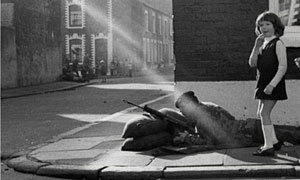
"Bloody Sunday" is the term used to describe a massacre in Derry, Northern Ireland, in which 14 protesters were killed and 26 wounded, occurred on January 30 1972, when the 1st Battalion of the Parachute Regiment of the British army broke up a peaceful demonstration for civil rights and against the government of Northern Ireland. Of the fourteen deaths, six were minors, and one was wounded and died months after the incident. All five victims were unarmed and were shot at them from behind. The demonstrators were protesting against the policy of the Irish government summarily arresting people suspected of terrorist acts. This policy was directed against the Irish Republican Army, the IRA, an underground organization fighting for the separation of Northern Ireland from Great Britain and later union with the Republic of Ireland.
After "Bloody Sunday", the IRA has won a huge number of volunteers, giving even greater force to this guerrilla group. In memory of that day, was made the song Sunday Bloody Sunday! in 1983, the Irish band U2.
The Irish Republican Army (IRA) started its campaign against Northern Ireland being a part of the UK for two years prior to Bloody Sunday, but perceptions of the day boosted the status of recruitment and the organization greatly.
Bloody Sunday remains among the most important events of the Troubles in Northern Ireland, mainly due to the fact that it was carried out by the army.
Source: Wikipédia


No comments:
Post a Comment